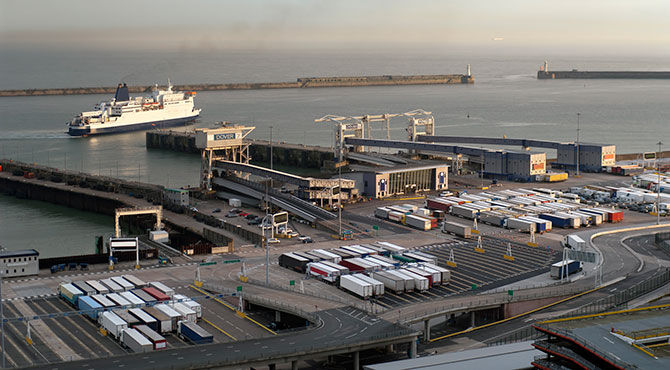Post-Brexit customs conundrum facing UK firms
Business across the UK will need more prepared for changing customs arrangements post-Brexit, according to the British Chambers of Commerce and the Port of Dover.

 30 April 2018
30 April 2018UK export and import concerns
The survey of 835 exporting or importing businesses across the country, conducted by the British Chambers of Commerce (BCC) and the Port of Dover, found that delays in the delivery of material and components at UK ports would lead to considerable business disruption, particularly for those operating a ‘just-in-time’ model.According to the survey, 29 per cent of companies said they would feel the impact of delays at ports in terms of administration, costs or operations but that a third of businesses admitted they had no contingency plans in plans to cope with likely new customs procedures.“The sheer volume and speed of trade between the UK and EU reinforces how vital it is for both government and business to be clear on a delivery timetable for the necessary infrastructure investment and systems to be in place,” said the BCC.“The government needs to promptly define its vision for the end state relationship with the EU so that businesses have clarity, and are in a position to implement the necessary changes to their operations from the start of the transition period.“In the meantime, firms should be planning for how different scenarios could impact them, and consider the implications now to minimise disruption in the future.”Related stories:
- Hard Brexit will damage the benefits of UK citizenship says new report
- Brexit: what lies ahead for the UK’s financial services?
- EU chief rejects bespoke deal for UK financial firms
Ensuring continued flow of trade goods
The report pointed out that about a third of the UK’s trade in goods crosses the English Channel via the Port of Dover and Eurotunnel, and, consequently, “maintaining fluidity throughout the journey of trade in goods, both at ports and along the key strategic road arteries serving them, is essential”.While two-thirds of respondents said they were unlikely to move operations in the next three years, 30 per cent said they were dissatisfied with the infrastructure leading to and from ports they used.Dr Adam Marshall, director-general of the BCC, said, “While a lot remains to be agreed about the nature of the future trading relationship with the EU, the UK government has made clear its intention to leave the Customs Union.“Firms need to know what checks and declarations they will have to go through on trade with the EU – and need to start planning for the changes ahead.“Understandably, the lack of certainty over the terms of the final settlement with the EU makes it hard to plan with confidence, but businesses shouldn’t be complacent about preparing for new processes under different scenarios. The businesses most likely to be impacted by change at the border must start thinking through the consequences for their supply chains, freight forwarding arrangements, software requirements and budgets. Leave it too late, and firms could face even greater disruption or cost when the time comes for changes to border arrangements to be implemented.“Business needs to look hard at how they will operate under new conditions in the future, but the same applies to the government. If there is to be minimal friction between the UK and the Continent, then physical infrastructure such as inland clearance, IT systems for quick risk assessments, as well as agreements on no doubling up of checks between the UK and the EU, must be implemented as soon as possible.”Pan-European just-in-time supply chains
Richard Christian, head of policy at the Port of Dover, added, “It can surely be no coincidence that the cross-Channel trade corridor with the UK’s nearest and largest trading partner, of which Dover is a major part, handles around a third of the UK’s trade in goods and that a similar percentage of British traders rely on the just-in-time delivery of material or components via fluid borders and roads serving them.“The Port of Dover provides pan-European just-in-time supply chains with the efficiency and fluidity needed by British, Irish and European farmers, traders and manufacturers, as well as ordinary citizens.“There is no substitutable capacity elsewhere that can handle the type and volume of goods that Dover does. For the sake of UK plc, it is vital that fluidity at Dover and throughout the supply chain is maintained, by keeping checks to a minimum and any that need to be made are done away from the Port, by bringing forward targeted road investment to key trading gateways such as A2 dualling to Dover linked to the Lower Thames Crossing which we support, and through the awareness raising of businesses. “We need to work together to ensure the shortest, most efficient route to market stays that way so that goods continue to flow and jobs are safeguarded.”For related news and features, visit our Brexit section. Find out more about our upcoming Relocate Awards. Relocate’s new Global Mobility Toolkit provides free information, practical advice and support for HR, global mobility managers and global teams operating overseas. Access hundreds of global services and suppliers in our Online Directory
Access hundreds of global services and suppliers in our Online Directory
©2026 Re:locate magazine, published by Profile Locations, Spray Hill, Hastings Road, Lamberhurst, Kent TN3 8JB. All rights reserved. This publication (or any part thereof) may not be reproduced in any form without the prior written permission of Profile Locations. Profile Locations accepts no liability for the accuracy of the contents or any opinions expressed herein.






























